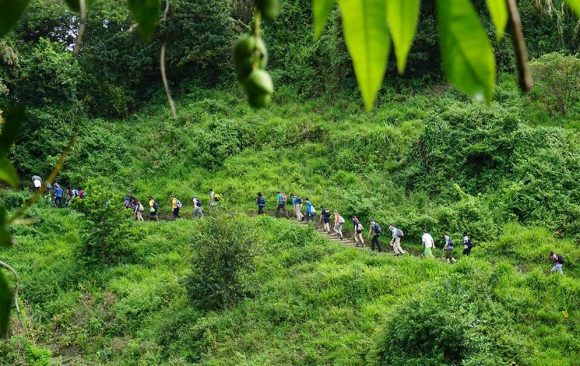Should Travelers Acknowledge Their Impact on the Environment and Cultures of Their Destinations?

Courtesy to the International Ecotourism Society
On ecotours, tourists take place in activities in remote areas, such as hiking in a rainforest.
December 10, 2019
When people travel, they don’t really think about how they impact the environment, cultures, societies of the places that they visit. Instead, they focus on spending time with whomever they travel with and enjoying what they plan on seeing or doing in the most comfortable way possible. Although it may not seem this way, the leisurely activities that people take part in during their travels are adding up to the world’s climate change and placelessness.
It is unrealistic to have people feel any sort of guilt when they travel because there is little to no way for them to get around this obstacle. People who travel for work or other events can’t give up this activity because it will become more difficult for them to get things done. Their destination could be too far to walk, but taking a plane or car is more harmful to the environment. Additionally, a city or country’s economy could be based on tourism, and with the absence of tourism, their economy would lose its value.
Even if people are unable to control how they get to their travel destinations, they should at least try to minimize their impact on the places that they visit. For example, the small, “travel-sized” plastic bottles that are used for shampoo are single-use products, which will generate a lot of waste when thrown away.
However, eliminating the use of single-use products may only reduce the amount of waste generated from tourists. What about tourists’ impact on an area’s culture? The solution is ecotourism. Ecotourism is a type of tourism that is aimed to have minimal impact on both natural environments and cultures.
Ecotours generally take place in areas outside of the urban centers like cultural villages or other areas with very little inhabitants. Types of ecotourism include eco lodging, eco treks, and community development. Eco lodging can vary from a hotel to a hostel that is made to sustain the environment. Tourists could even stay with a family in a local village! Activities that bring awareness to the current environmental conditions of an area are known as eco treks. A few examples of eco treks are hiking, sailing, and bird-watching. Some ecotours focus on helping the community of an area by planting trees, building homes, and interacting with the local people. All of these contribute to the preservation of the cultures and environment in the location of the ecotour.
Areas that rely on tourism can still turn to ecotourism for their main source of income. Elena Moreno (9) agrees and believes that “even if ecotourism doesn’t generate as much money as other types of large-scale tourism, it is protecting the environment and cultures of different places.” Many people probably don’t want to give up the leisure of travel, so ecotourism is one of the best solutions to maintaining environmental and cultural sustainability.


































